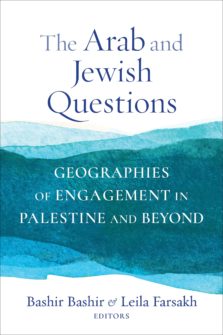 The Arab and Jewish Questions: Geographies of Engagement in Palestine and Beyond interrogates the opposition between the “Arab” and the “Jew” in order to challenge dominant understandings of political identities, nationalism, and citizenship rights. It is a result of a series of workshops organized by the Bruno Kreisky Forum for International Dialogue in Vienna that brought a wide range of scholars together who put the Arab and Jewish questions in conversation with one another (rather than treating them as two distinct concerns, as is often the case). This book revisits European modernity by exploring contemporary Arab engagement with “the Jewish question,” which was created by and in Europe, by delving into how Arabs have dealt with the question of Jewish political rights in light of European antisemitism and Zionism. It gives as much attention to Jewish engagement with the “Arab question,” as European colonialism called it, by shedding new light on how Zionist and non-Zionist Jewish voices have dealt with the political rights of Palestinians in historic Palestine. The book’s originality lies in subverting our understanding of these two questions by exposing how they are inextricably intertwined, not only by their histories, but also by their contemporary concern with questioning modernity as well as articulating the meaning of political equality today. The various chapters included in this volume allow us to better understand how European modernity enabled, as much as constrained, geographies of entanglement in Palestine and beyond, as well as offer us new analytical and political perspectives that transcend the confines of ethnic nationalism and the exclusionary understanding of equality.
The Arab and Jewish Questions: Geographies of Engagement in Palestine and Beyond interrogates the opposition between the “Arab” and the “Jew” in order to challenge dominant understandings of political identities, nationalism, and citizenship rights. It is a result of a series of workshops organized by the Bruno Kreisky Forum for International Dialogue in Vienna that brought a wide range of scholars together who put the Arab and Jewish questions in conversation with one another (rather than treating them as two distinct concerns, as is often the case). This book revisits European modernity by exploring contemporary Arab engagement with “the Jewish question,” which was created by and in Europe, by delving into how Arabs have dealt with the question of Jewish political rights in light of European antisemitism and Zionism. It gives as much attention to Jewish engagement with the “Arab question,” as European colonialism called it, by shedding new light on how Zionist and non-Zionist Jewish voices have dealt with the political rights of Palestinians in historic Palestine. The book’s originality lies in subverting our understanding of these two questions by exposing how they are inextricably intertwined, not only by their histories, but also by their contemporary concern with questioning modernity as well as articulating the meaning of political equality today. The various chapters included in this volume allow us to better understand how European modernity enabled, as much as constrained, geographies of entanglement in Palestine and beyond, as well as offer us new analytical and political perspectives that transcend the confines of ethnic nationalism and the exclusionary understanding of equality.
The motivation for this juxtaposition between the Arab and Jewish aspiration for political equality and freedom arises from three deeply interconnected and important developments that have taken place over the past two decades. First, the Oslo peace process has failed to resolve the Israeli-Palestinian conflict. The ongoing colonization of Palestine created irreversible realities that cast serious doubts on the feasibility of partition and the “two-state solution” that this accord offered as the way forward. Zionist colonization has also deepened the intertwinement between Israeli and Palestinian lives, making the equality of Palestinian and Jewish rights in Palestine/Israel central. This issue is still far from resolved. Second, the Arab uprisings that erupted in a number of Middle Eastern countries in 2011 signaled the demise of grand assimilationist ideologies like Arabism, Ba’athism, and Islamism. These uprisings expressed people’s rejection of their authoritarian regimes and the state-sanctioned definition of the collective “we.” They brought to the fore the diverse ethnic and cultural realities that nationalist ideologies sought to repress, as well as a clear demand for democracy and a state that was accountable to all its citizens. Third, Islam and Muslims have become the new internal signifiers of otherness, particularly in the west. This change has posed serious challenges to existing conceptions of democracy in the West. The rise of Eurocentric and Islamophobic notions of citizenship are intimately connected to the globalization of the neoliberal political economy today. They are equally tied to the suppressed memories of Europe’s colonial “past.” These notions reflect an intimate conceptual and historical link between Judeophobia and Islamophobia in Europe, one that continues to impact the Middle East, and the Israeli-Palestinian conflict more specifically, in more ways than one.
The Arab and Jewish Questions exposes the intersections between the legacy of European colonialism, the failure to resolve the Arab-Israeli conflict, and the persistent demand for equal citizenship rights in the Arab world and the west. It shows that the question of Palestine/Israel, the Arab/Muslim question, and the Jewish question are not only entangled, but also belong to the same history. The first part of the book focuses on the historical connection between the Arab and Jewish questions, shedding new light on how they are tied to Europe. The three chapters in this section unpack the link between antisemitism and Islamophobia, showing how it is intrinsically tied to Europe’s refusal to confront its colonial legacies and address its racial prejudices today. It is a product of Europe’s fundamental failure to deal with any non-Christian “other” and of its attempt to transport this failure outside its borders.
The rise of Eurocentric and Islamophobic notions of citizenship are intimately connected to the globalization of the neoliberal political economy today. They are equally tied to the suppressed memories of Europe’s colonial ‘past.’
The second part of the book explores the political connections between the Arab and Jewish questions by highlighting their concerns with notions of political rights and equality. The four chapters in this section go beyond the binary division between the “Jews” and the “Arab” by discussing the figure of the Arab-Jew, which the chapters of Ella Shohat and Hakem Rustom engage more deeply. They each expose the ways in which Zionism and Arab nationalism negated the Arab dimension of Jewishness and repressed the Jewish dimension of Arab identity as a result of their respective ethnic, and intrinsically chauvinistic, definition of the nation-state. The chapter by Yuval Evri and Hillel Cohen challenges the uniform narrative that the Israeli historical establishment has tried to propagate about Jewish political uniformity by exposing how early Zionist and non-Zionist Jewish voices dealt with Palestinian political rights, affirming their congruency with Jewish political rights.
The third, and last, part of the book puts the Arab and Jewish questions into conversation with one another in order to start imagining a viable political alternative to the present stubborn reality that is marked by the ongoing Palestinian Nakba, continuous Israeli aggressions, and failed peace negotiations. The three chapters in this section stress the need to go beyond partition as a paradigm for resolving political problems. In this regard, in her chapter, Jacqueline Rose invites us to engage in the important and difficult task of undertaking a deep introspective approach to one’s nationalist discourse in order to transcend entrapments of victimhood that hamper any liberatory politics. The chapters from Behar and Masarwi explain the dialectic of national identities and unpack some of the challenges that face bi-nationalism or any alternative one-state solution to the Israeli-Palestinian conflict. These include finding the means to protect both the individual and collective political rights of Palestinians and Israelis, and to rethink nationalism in more inclusive terms. Such rethinking is ever more pressing today, as the Middle East seeks to create new political entities that protect the rights of others—be it Jews, Kurds, Yazidis, or Copts—as equal citizens rather than as protected minorities, and calls on the state to create new structures that guarantee inclusivity, accountability, and equality for all.

